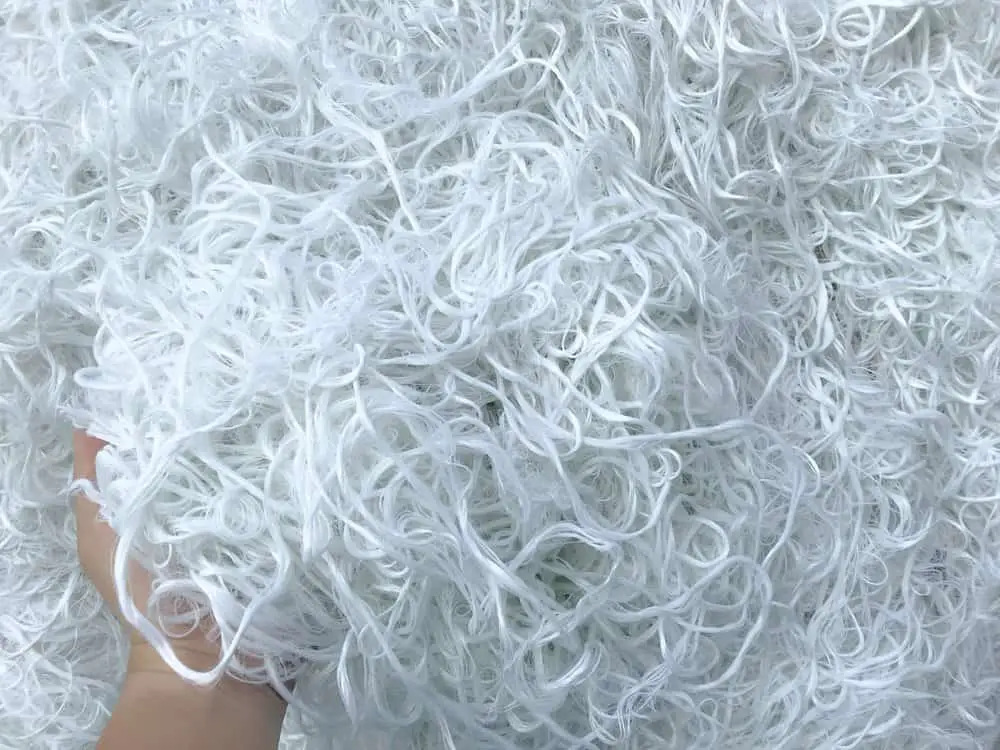Is Polyester Good For Hiking? 10 Facts You Need To Know

The type of cloth you wear determines how comfortable you would be when hiking. Polyester’s ability to wick moisture helps one stay cool and less sweaty irrespective of the prevailing weather condition. Since hiking involves long walks that could make you sweat, is polyester good for hiking?
Yes, polyester is good for hiking, especially in winter. Polyester clothing is breathable, lightweight, durable, and ideal for most outdoor activities. Being breathable allows airflow and moisture evaporation and does not chafe the skin.
While polyester is good for hiking, is it ideal for every season? Is polyester good for your skin? We’ll go more in-depth and get into it all in this article.
Quick Links
Is Polyester Good For Hiking?
Yes, polyester is good for most outdoor activities, including hiking and backpacking. A breathable material, polyester is both lightweight and durable. While other materials like jeans can make you feel uncomfortable during a hike, especially when wet, polyester does not chafe the skin. It also helps rid the skin of excess moisture, keeping you dry during long hikes. Below are the advantages and disadvantages polyester offer when used in hiking:
Why Polyester is Good for Hiking
- Protection from Sunlight: Polyester hiking fabric protects you against the sun’s ultraviolet rays. Woven in a tight pattern, polyester lets very little light through, thereby keeping your skin safe. It is also easy to dye the fabric, which improves its UV rays protection capacity.
- Keeps you warm: Polyester’s easy layering and ability to wick moisture make it perfect for cold weather. If you have ever experienced evaporation in winter, you know just how dangerous it can be hiking without good clothing, but a good polyester hiking jacket can keep you warm. Since polyester is a plastic, layering them helps prevent such experiences, helping the body maintain optimal heat even in freezing temperatures. This increases the weight you have to bear on the hike and exposes you to hypothermia.
- Lightweight: Hiking with thick materials such as cotton is not always favorable for a hiker, especially when there is a turn in the weather. Unlike cotton, polyester is lightweight and dries very fast since it absorbs very little. Wearing heavy materials like cotton during the rain could spell disaster, as cotton absorbs water and takes longer to dry out. If you want to feel safer, you should consider wearing a good polyester hiking jacket and pants.
- Fast Dry: Chaffing and other skin injuries are a genuine concern during hiking, so having a fast-drying and moisture-wicking material is important. Chafing occurs because of friction between material and skin, and it gets worse when there is moisture involved. A completely wet polyester would dry out faster than partially wet cotton material. The faster your cloth dries, the less likely chafing and other skin injuries occur.
Cons Of Polyester While Hiking
While there are many reasons to use polyester hiking fabric during a hike, there are also downsides, as shown below;
- Allergic: People with highly sensitive skin might find polyester hiking clothes uncomfortable. Some people complain of a scratchy or itchy feel when wearing polyester materials.
- Smelly: The sweat produced by the body contains natural oils, the moisture-wicking ability of polyester fails in this aspect. After a long hiking trek, oil accumulates on the polyester material, making it smell a bit rancid. However, a simple wash will remove the smell.
- Highly Flammable: You might spend nights out in the wild during hikes and backpacking, and lighting campfires is necessary. Wearing a good polyester shirt close to a fire exposes you to a fire hazard as polyester fabrics are naturally flammable.
Is Polyester Breathable?
While polyester fibers are not breathable because of their Polyethylene Terephthalate makeup, polyester fabrics are breathable. Their breathability level depends on yarn size, structure, and weave. Now that we know that polyester fabrics are breathable, let us explain the term breathability.
Breathability does not only mean the ability to allow air to pass through but also takes into consideration how easy it is for moisture to enter or leave the material. So, what factors affect the breathability of good polyester hiking clothes?
Material Production
The production method of polyester hiking clothes plays a role in its breathability. Fabrics produced from microfilaments offer more breathability than those produced from fiber. Microfilament polyester offers a larger surface area, resulting in more air gaps and water resistance.
Structure
This includes the fabric and yarn structure. How tightly or loosely woven the polyester fabric is also impacts its breathability—loosely woven fabric results in bigger gaps, big enough for air and water vapor exchange.
Does Polyester Stay Dry?
Yes, polyester stays dry. Polyester is one material that combines waterproofing and breathability. It absorbs little moisture, and this gives it the ability to dry quickly and stay dry because there is little quantity of water to evaporate.
Is Polyester Good For Hiking In The Winter?
Many winter hikers prefer polyester clothing, especially ones designed for cold hiking, so they are good enough for hiking in the winter. A good polyester hiking jacket has moisture-wicking properties and is breathable to help keep the skin dry. Materials designed specifically for winter hiking also provide extra insulation and thermal comfort, giving you protection from the elements.
Are you thinking of wearing polyester hiking clothes for winter hiking? Avoid loosely woven polyester as they tend to let in too much air, which could give you a cold. Tightly woven ones are ideal for winter hiking as they offer you the insulation you need making polyester good for hiking.
Is Polyester Good For Summer?
Generally, polyester hiking fabric is not ideal for hot weather because of its ability to trap heat inside. Polyester being suitable for the summer depends on its structure, as it determines how hot you might feel. Made from Polyethylene, polyester is plastic, and only its design makes it breathable.
Depending on the structure, there are many polyester fabrics for winter and summer. Wearing polyester close to the skin in hot weather can make you feel sticky and uncomfortable. The ones for winter have superb moisture-wicking ability, keeping your skin dry and cool at all times.
For summer hiking gear, I would choose cotton or a polyester-cotton mix.
Is Polyester Good For Your Skin?
Polyester is not ideal for the skin because, unlike natural fabrics, it does not allow the skin to breathe. This traps heat and moisture close to the skin, which can cause skin irritations. Polyester clothing can also cause you to sweat more. This heat stimulates oil production, which can cause acne, dermatitis, and other skin conditions.
Secondly, it is not ideal for people with polyester allergies as they experience a skin reaction whenever their body encounters polyester.
But how do you know you are allergic to polyester hiking fabric?
If you experience these symptoms when in contact with polyester, you might be allergic to it: blistering, swelling, itching, dryness, redness, and skin irritation. How soon you experience these allergies varies from minutes to hours or even one or two days.
To prevent allergies, the best thing is to avoid contact with polyester. Since polyesters are part of our daily life, using topical or oral steroids, moisturizers and antihistamines can help relieve the symptoms of allergies. But if in doubt, always consult your doctor first.
Is Cotton Better Than Polyester?
Both polyester and cotton have their uses, advantages, and disadvantages. Cotton fibers are composed of pure cellulose and offer comfort, absorbency, and breathability. On the other hand, polyester derived from petroleum is the world’s most popular synthetic textile.
The similarities between both materials include their ease of manipulation. Both these materials can withstand bleach, detergents, and heat. You can dye them to any color, and they have an awesome range of applications.
So what are their differences?
Makeup
Cotton comes from natural plant sources, while polyester is a synthesized petroleum derivative. This makes cotton more sustainable than polyester hiking fabric.
Strength
Due to their chemical makeup and buildup, polyester clothing is quite stronger than cotton. It also can stretch, making it more durable.
Water absorption
Materials made from polyester do not absorb sweat since they are hydrophobic. On the other hand, cotton absorbs sweat and moisture. The ability to repel moisture makes polyester good for hiking.
Breathability
Almost all skin types tolerate cotton, irrespective of skin sensitivity. This is because of their breathability. On the other hand, polyesters can cause allergies in people with sensitive skin and have minimal moisture absorption capacity.
Stain-resistant
Polyester hiking material does not absorb stains and dirt. It also resists wrinkles and stains better than cotton and takes a long time to fade.
Is Polyester Friendly For The Environment?
Unfortunately, polyester is not very friendly to the environment as it is made from a carbon-intensive and non-renewable source. Also, polyesters are not biodegradable, which means they stay in the ecosystem for a long time. Polyesters remain in the environment, wildlife, and oceans for several hundred years if recycling does not occur, which could be very harmful. Below are the effects of polyester on the environment.
Use of Fossil fuels
Fossil fuels are the major contributors to CO2 emissions worldwide. In producing polyesters, manufacturers use over 70 million barrels of oil. The toxins released by burning these fossils negatively impact the environment and living organisms.
Non-biodegradable
Polyester is not a biodegradable material and takes up to two centuries to decompose completely. It releases methane, a greenhouse gas that degrades the Ozone layer faster than CO2 as it decomposes. Methane is also highly flammable and a major contributor to climate change.
Pollution
A new study shows that it releases tiny synthetic microfibers when we wash the polyester fabric. This poses a threat to our environment by causing the buildup of these microfibers in our water bodies. These microfibers make up about 31% of all plastic pollution in our water bodies, exposing marine life to harm.
Studies also show that these microfibers are present in our waterways, meaning we often drink and breathe them in. They have harmful effects on the body, such as hormone interference and reducing the fertility of both genders.
Also, the production of polyester fabrics requires the use of dyes and other chemicals. These chemicals are also present in our water bodies, as manufacturers often drain them into the ocean. They cause skin conditions like rashes.
Nylon vs polyester, which is better?
Both nylon and polyester are synthetic fabrics with a similar fabrication process, and they also share many attributes. However, both fabrics are not the same, and there are several advantages polyester has over nylon. These include:
Breathability
Nylon is not breathable, which means it often traps moisture and heat close to the skin. This makes it clingy and uncomfortable in humid weather. Nylon might be suitable for hiking in cold weather but not in summer.
On the other hand, while polyester is not very breathable, its moisture-wicking ability helps cancel out this flaw. Generally, the polyester fabric offers more breathability than nylon making polyester good for hiking.
Comfortability
Nylon is softer than polyester. It is light and has a fine texture, and it has been used in the production of dresses and underwear.
Waterproof
Nylon and polyester are water-resistant, but polyester’s hydrophobia gives it an edge over nylon. Water stays on the surface of polyester instead of sinking through it.
On the other hand, nylon absorbs moisture, and this causes it to reduce in size, especially in dry environments.
Odor Retention
This is a major difference between these two fabrics. Polyester tends not to lose smell even after thorough washing because it absorbs oils. This oil absorption transfers odors from your skin to the polyester fabric. Nylon does not retain oil and odor.
UV Rays Protection And Resistance
Polyester resists UV rays largely, which means it does not fade or lose color quickly. This also translates to protection for you from the harmful effects of Ultraviolet rays. On the other hand, nylon fades quickly if it remains outside for long.
Polyester Vs Merino Wool
While both materials are great for hiking, there are a few differences between them, and we’ll get into the most important factors:
Comfortability
Made from wood fibers, merino wool is more comfortable than polyester. They are also hypoallergenic and do not itch.
Breathability
Merino wool is more porous than polyester, which makes it more breathable. This makes merino wool more suitable for hiking during the summer
Durability
For high-intensity exercises like hiking and running, polyester is ideal. High-intensity workouts expose merino wool to wear and tear, while polyester fabrics last for ages under such intensity.
Odor Retention
Merino wool does not retain odors as much as polyester fabric does. They have antimicrobial properties, which give them excellent odor control. Polyester fabrics, on the other hand, retain odors even after washing.
Final Word
So, Is polyester good for hiking? Being a highly functional fiber, it is a great fabric for sports and activewear, making it perfect for hiking. It is durable, water and UV resistant, and modification helps improve its properties. If you can look past its downsides, all of its great qualities make polyester more than ideal for hiking your favorite trails.







